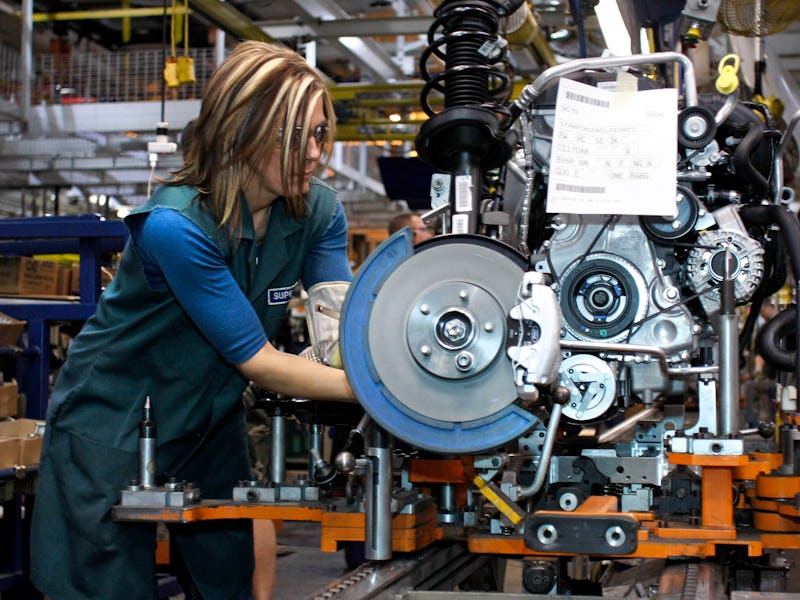New Study Confirms that, Yes, Automation Is Taking Jobs

In the ongoing debate over whether or not automation takes jobs or creates them, there are both alarmists and skeptics. But this week, the researchers behind one of the most widely cited skeptical papers in the field seemingly switched sides.
A new paper released jointly by researchers from MIT and Boston University argues that, contrary to its authors’ prior work, automation really is taking jobs from Americans, and no, it’s not creating enough new jobs to replace them. The study found that changing the robot-human ration by one more robot per thousand workers eliminates roughly two to three jobs.
Study co-author Daron Acemoglu of MIT tells Inverse via email that even if new jobs are coming, they might not arrive for a very long time. “We are still at the beginning of the process of robotics,” he writes, “and some of these adjustments take time. It took several decades, perhaps as much as 70 years for this to happen in the case of the new waves of spinning and weaving technologies during the British Industrial Revolution.”
“But equally important might be that robots are less complementary to a distinct set of skills that exist in the labor market at the moment than previous technologies.” For example, Acemoglu notes that computers were highly complementary to engineers and other data-focused professions, while robots are less often aimed at making some related human task more efficient.
The study’s other main author, Pascual Restrepo of Boston University, tells Inverse that he believes robotics is presenting challenges for the labor market because, more than ever before, new jobs require new skills or a different mindset. “It could also be the case that firms only create new jobs and new tasks in tech hubs, but not in the middle of the Rust Belt,” he notes. “Although that would be reassuring from a national point of view, it is not comforting to workers in exposed regions, nor to workers who lack the specialized skills required in [these] new jobs.”
The study is explicit about the relationship between robots and employment. According to the study’s findings, one more robot per thousand workers “reduces the employment to population ratio by about 0.18-0.34 percentage points, and wages by 0.25-0.5 percent.” The Bureau of Labor Statistics says there are about 123 million workers in the U.S. That means that for every 123,000 robots put to work, the U.S unemployment rate will go up by 0.18-0.34 percent, which is a lot of people out of work. To put that in perspective, American industry reportedly purchased about 40,000 industrial robots in 2016 alone, and that rate is expected to increase sharply each year, well into the 2020s. This rate adds to the similar effects of offshoring jobs and other, more mundane, contributors.
Restrepo points out that “the number of industrial robots is expected to quadruple in the next 10 years, [but] workers could adjust more easily as time goes by… If robots keep replacing workers at the rate that we estimate, we could expect them to reduce employment by 1.5-2.5 million jobs.”
What, if any prescriptions for future action can we take from this warning? True to his prior work, Acemoglu warns against doomsday scenarios. “I don’t think this will take the form of mass unemployment. We are talking of half [a] million people having lost their jobs because of robots so far, and it might increase, but we are still not talking of mass unemployment.” Nevertheless, he said we’ll need to offset those societal effects automation will have, suggesting things like better retraining programs and labor market assistance, which industry insiders are beginning to recognize.
Acemoglu’s overall point seems to be that while the problems of automation are real, they could be limited to certain workers who will have a hard time reorienting themselves to new markets. That’s unavoidably bad for those individuals — this is why market economists are coming to favor limited social assistance programs — but the effect might not be apocalyptic for the system as a whole, so long as the effect is limited to that small cohort of workers. If automation freezes out not just certain immutable skills, but whole areas of talent and all their possible future applications, then it could be a much bigger problem.
“What we need,” writes Restrepo, “are policies to help all workers share the large productivity gains that such technologies bring.”
But if, as some predict, the effects of automation will keep accelerating, they could someday cause the sort of “mass unemployment” that both Acemoglu and Restrepo see as unlikely in the short term. At this point, the question isn’t whether robots are taking jobs from Americans, but how fast it’s happening and, more importantly, how long it’s going to last.